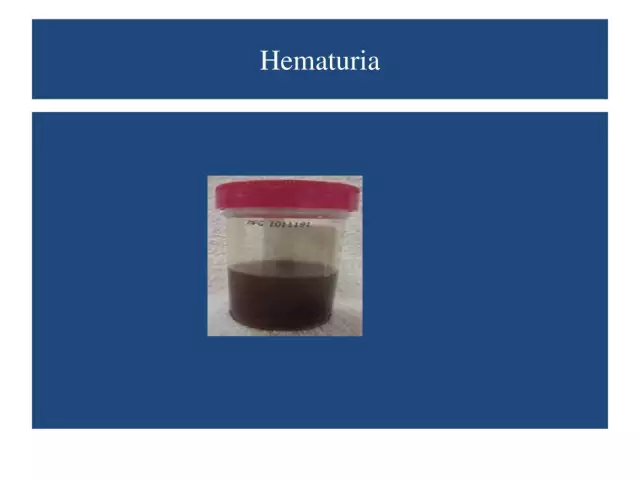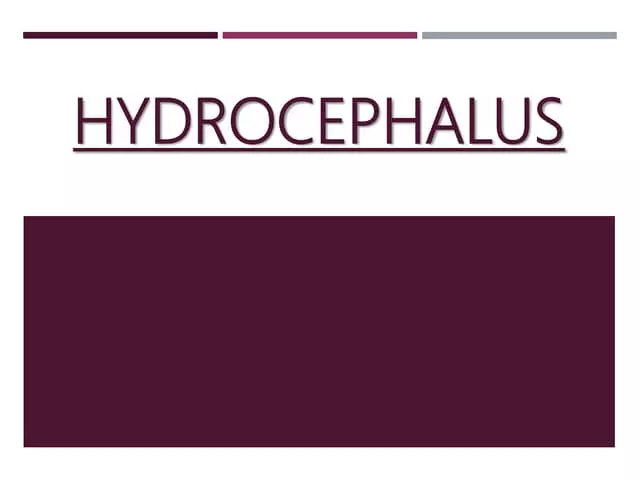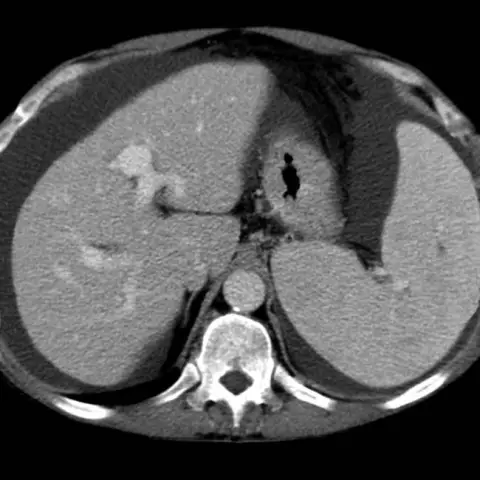Medical terms
Last modified: 2025-11-02 20:11
Sinusitis - inflammation of the mucous membrane of the maxillary sinus
Last modified: 2025-11-02 20:11
Hallucinosis is a psychopathological syndrome characterized by profuse hallucinations, in some cases accompanied by delirium
Last modified: 2025-11-02 20:11
Gangrene (gangraena; Greek gangraina from grao - to gnaw, to eat) is one of the types of necrosis, characterized by mummification (drying) or necrosis of tissue, or its putrid decay
Last modified: 2025-11-02 20:11
Gastrectomy - surgery to completely remove the stomach followed by an anastomosis between the jejunum and the esophagus
Last modified: 2025-11-02 20:11
Gastroenterostomy is a surgical procedure that involves placing an anastomosis between the small (mainly jejunum) intestine and the stomach
Last modified: 2025-11-02 20:11
Hemangioma - a benign tumor arising from the blood vessels
Last modified: 2025-11-02 20:11
Hematuria (haematuria; Greek haimatos, haima - blood + Greek uron - urine; synonym: true hematuria) - the presence of erythrocytes or blood in the urine
Last modified: 2025-11-02 20:11
Hemiplegia (hemiplegia; Greek hemi- - semi-, one-sided, half + plege - defeat, blow) - unilateral paralysis of the muscles of the body
Last modified: 2025-11-02 20:11
Hemothorax (haemothorax; Greek haima - blood + Greek thorax - chest, chest; synonym: hematothorax) - the presence of accumulated blood in the pleural cavity
Last modified: 2025-11-02 20:11
Hemophilia is a hereditary disease transmitted by a recessive sex-linked type caused by a deficiency of plasma factors VIII or IX of blood coagulation; characterized by symptoms of increased bleeding
Last modified: 2025-11-02 20:11
Generalization in pathology (generalisatio; lat.Generalis - general, main) - the spread of a pathological process in an organ or the whole body from a limited focus
Last modified: 2025-11-02 20:11
Herpes is a name that unites a group of pathologies excited by viruses of the same group, and expressed by a rash on the mucous membranes and / or skin of grouped small vesicles on an erythematous-edematous base
Last modified: 2025-11-02 20:11
Heterochromia of the iris (heterochromia; Greek heteros - other, different + chroma - color, color; synonym: heterophthalmos) - unequal color of the iris of the left and right eyes or a dissimilar color of different parts of the iris of one eye
Last modified: 2025-11-02 20:11
Gigantism is a clinical syndrome that manifests itself as unusually tall (in men over 200 cm, in women over 190 cm) or excessive enlargement of certain parts of the body
Last modified: 2025-11-02 20:11
Hydronephrosis is a kidney disease characterized by significant persistent expansion of the calyx and pelvis with atrophy of the renal parenchyma; occurs as a result of a violation of the outflow of urine
Last modified: 2025-11-02 20:11
Hydrocephalus - excessive accumulation of cerebrospinal fluid in the intrathecal spaces and ventricles of the brain; manifests itself as signs of increased intracranial pressure
Last modified: 2025-11-02 20:11
Gymnastics is a system of physical exercises that includes various combinations of movements with regulated speed, pace and amplitude, as well as dosed muscle tension
Last modified: 2025-11-02 20:11
Gynecology is a branch of clinical medicine that studies the physiology of the female reproductive system and its diseases, and develops methods for their diagnosis, prevention and treatment; issues related to childbirth and pregnancy are studied by obstetrics
Last modified: 2025-11-02 20:11
Gynecomastia (gynaecomastia; Greek gyne, gynaikos - woman + Greek mastos - breast) - an increase in the mammary glands (one or both) in men
Last modified: 2025-11-02 20:11
Hypervitaminosis is a name that unites pathological conditions arising from the intoxication of the body with excessive intake of vitamins
Last modified: 2025-11-02 20:11
Hyperhydration (hyperhydratatio; Greek hyper- - over, over, excessively + hydor - water; synonym: hyperhydria) - excessive water content in the body or its parts
Last modified: 2025-11-02 20:11
Hyperhidrosis (hyperhidrosis; Greek hyper- - over, over, excessively + Greek hidros - sweat + Greek -ōsis (word-form suffix) - disease; synonym: sweating) - increased sweating
Last modified: 2025-11-02 20:11
Hyperglycemia (hyperglycaemia; Greek hyper- - over, over, excessively + Greek glykys - sweet + haima - blood) - increased blood glucose
Last modified: 2025-11-02 20:11
Hyperkinesis - violent automatic movements resulting from involuntary contractions of various muscle groups
Last modified: 2025-11-02 20:11
Hyperplasia - an increase in the number of intracellular structures, cells, intercellular fibrous formations as a result of intensive organ function or as a result of pathological tissue neoplasm
Last modified: 2025-11-02 20:11
Hypertrichosis - excessive development of the hairline, which is expressed by excessive thickness and / or length, as well as an increase in the number of hairs, uncharacteristic for a given skin area, gender or age of a person
Last modified: 2025-11-02 20:11
Hypohydration (hypohydratatio; Greek hypo- - under, decrease, failure + hydōr - water, liquid; synonyms: dehydration, hypohydria) - decrease in the level of water in the body
Last modified: 2025-11-02 20:11
Hyposensitization is a complex of therapeutic and prophylactic measures designed to reduce the body's sensitivity to an allergen by inhibiting or preventing the development of immunological mechanisms of sensitization
Last modified: 2025-11-02 20:11
Hypospadias is a congenital developmental anomaly, consisting in the absence of the distal (lower) part of the male urethra with the location of its external opening in an unusual place
Last modified: 2025-11-02 20:11
Hypothyroidism is a syndrome of thyroid insufficiency, manifested by bradycardia, edema of the face, trunk and limbs, neuropsychiatric disorders
Last modified: 2025-11-02 20:11
Histamine test is a method for studying the secretory function of the stomach, based on the property of histamine preparations to intensify the secretion of gastric juice more intensively than other substances, having a predominant effect on the parietal cells that secrete hydrochloric acid
Last modified: 2025-11-02 20:11
Histology is a biomedical science that studies the patterns of structure, development and function of tissues in humans and multicellular animals
Last modified: 2025-11-02 20:11
Histoplasmosis is an infectious disease belonging to the group of systemic mycoses, excited by Histoplasma capsulatum
Last modified: 2025-11-02 20:11
Gliosis - the proliferation of astrocytic neuroglia, accompanied by hyperproduction of glial fibers, is the process of its replacement hyperplasia (an increase in the number of structural elements) in response to the death of nervous tissue
Last modified: 2025-11-02 20:11
Glomerulitis - inflammation of the renal glomerulus; is the leading element of morphological changes in glomerulonephritis
Last modified: 2025-11-02 20:11
Glucosuria (glucosuria; Greek glykys - sweet + Greek uron - urine) - the presence of glucose in the urine
Last modified: 2025-11-02 20:11
Fasting (inedia) - a condition of the body due to the complete absence or insufficient intake of nutrients into the body, or a sharp violation of their assimilation
Last modified: 2025-11-02 20:11
Hospitalization - placement in an inpatient medical institution (hospital, maternity hospital, hospital, etc.) of persons in need of medical assistance, treatment, obstetrics or in-depth medical examination
Last modified: 2025-11-02 20:11
Gradient is a quantity used in biology that reflects a quantitative change in any morphological or functional properties (including physicochemical) along one of the axes of an organ, body or cell
Last modified: 2025-11-02 20:11
Granulocyte - a leukocyte in which, when stained, granularity is found in the cytoplasm








































